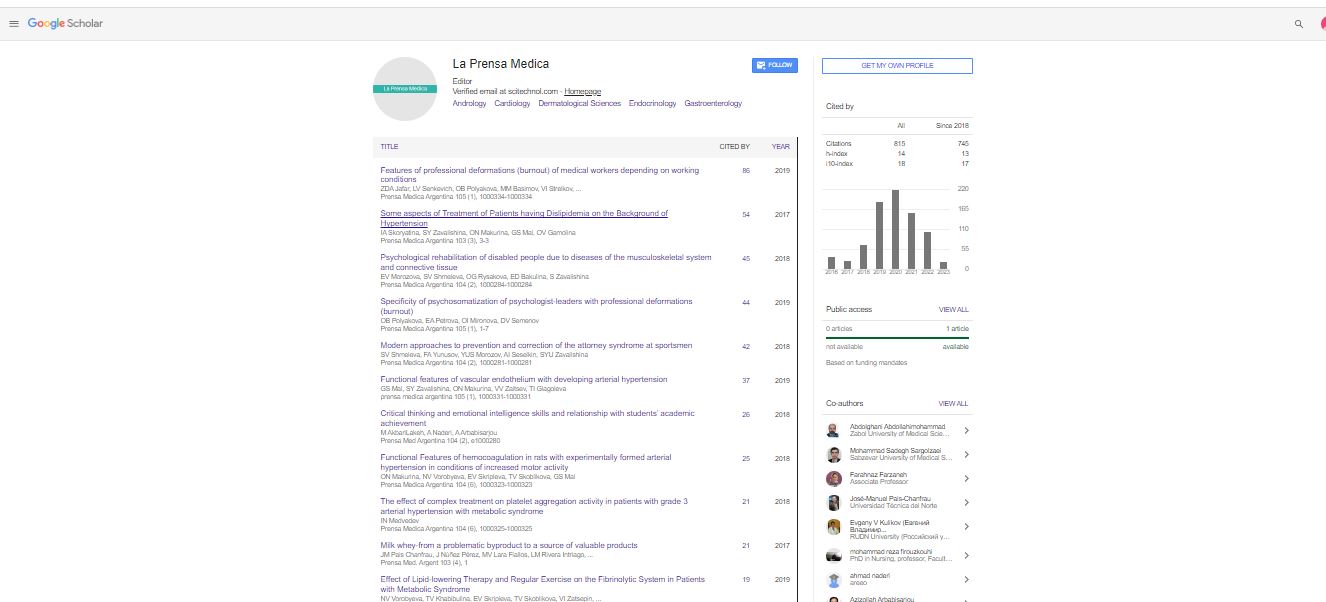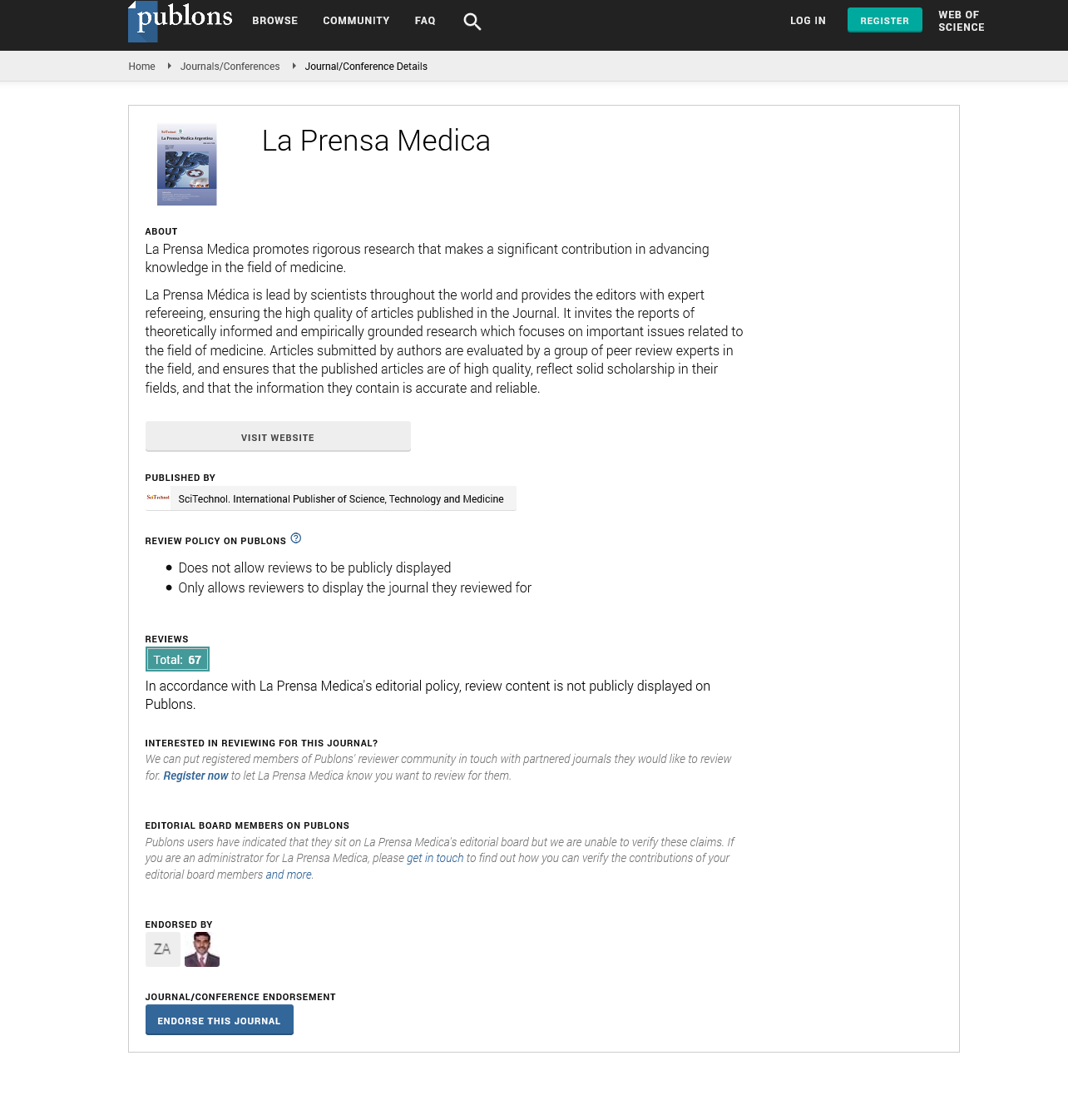Commentary, La Prensa Medica Vol: 108 Issue: 4
Modern Methods for Preventing and Treating Attorney Syndrome in Sportsmen
Tracey Wilson*
Department of Gynecology at Maimonides Medical Center, Brooklyn, New Zealand
*Corresponding Author: Tracey Wilson, Department of Gynecology at Maimonides Medical Center, Brooklyn, New Zealand, E-mail: Wilson@maimonidesmed.org
Received date: 01 April, 2022, Manuscript No. LPMA-22-64898;
Editor assigned date: 04 April, 2022, PreQC No. LPMA-22-64898 (PQ);
Reviewed date: 18 April, 2022, QC No LPMA-22-64898;
Revised date: 25 April, 2022, Manuscript No. LPMA-22-64898 (R);
Published date: 30 April, 2022, DOI: 10.4172/0032-745X.1000139
Citation: Wilson T (2022) Modern Methods for Preventing and Treating Attorney Syndrome in Sportsmen. La Prensa Medic 108:4.
Keywords: Andrology, Cardiology, Dermatological Sciences, Emergency and Internal medicine, Endocrinology
Description
Members of the National Academy of Neuropsychology and the Association of Trial Lawyers of America were surveyed concerning current practices in forensic neuropsychology. The maturity of neuropsychologists and attorneys reported that attorneys no way observe neuropsychological testing. Attorneys reported entering raw data in nearly all of their brain injury cases, but neuropsychologists reported that they produce raw data in only a non-age of their forensic cases. Also, smaller neuropsychologists than attorneys conceded that they're asked to give information to help the counsel in preparing for the cross-examination of the opposition's expert or to prepare the complainant for the opposition's evaluation. Attorneys generally spend up to an hour preparing their guests for neuropsychological evaluations and generally cover test content, discovery of malingering, and brain injury symptoms. Other motifs addressed include attorney influence on findings, freights and billing, board instrument, use of technicians, and styles used to induce referrals or detect experts. Areas of agreement and divergence between the groups were linked and ethical issues raised by linked practices were examined. The growth of neuropsychology as a clinical specialty over the once decade is well proved.
Rehearsing Neuropsychologists Neuropsychologists
Multitudinous papers published during that time have revealed the practices, beliefs, and norms of the profession as reported in the check responses of rehearsing neuropsychologist’s neuropsychologists had come integral contributors in the forensic arena, particularly in the action of cases involving claims of brain injury. A recent check linked the legal system as the third most current source of referrals for neuropsychologists, increased from fourth only 5 times before. Only neurology and psychiatry are more popular sources little information is available concerning the practices and beliefs of interpreters in this field. Nor is there important information available about beliefs and practices of particular injury attorneys as they relate to issues apropos to neuropsychology. As the subspecialty of forensic neuropsychology continues to grow, the need to determine and develop guidelines for practice becomes consummate. Similar information will be useful not only to interpreters who seek information as to the prevailing norms in the field, but also to the legal system as it attempts to more define the part of neuropsychology in particular injury action. The purpose of this study was to examine the practice of forensic neuropsychology from the perspectives of both the clinicians who exercise it and the individualities who most constantly hire and cross-question them, that is, particular injury attorneys. Information was attained from neuropsychologists concerning forensic practice demographics present the particulars contained in the checks transferred to attorneys and neuropsychologists and the chance of signatures in each response order. For questions posed to both attorneys and neuropsychologists, a priori intergroup comparisons were conducted exercising the ki-square test for independent proportions. For particulars where differences in the proportion of individualities championing a particular response order was of interest, either inter- or intragroup post hoc comparisons were performed using a z- test for dependent or independent proportions, as justified.
Diogenes Syndrome
Diogenes Syndrome (DS) refers to a collection of features factory mainly in aged persons which includes social sequestration, tone- neglect, poor insight, domestic squalor and hoarding behavior. Bolstering psychiatric conditions might be linked in ultimate of those elders. Issues of law have been bedded in DS cases, since individualities generally expose themselves and their neighborhood to preventable health risks, due to extreme tone- neglect and poor sanitation. This slice aims to assess health- care, cognitive and civil capacity status of cases with DS, predicated on data from forensic- medical reports. Psychiatric- forensic reports concerning to elders living alone, recorded in the libraries of the Public Attorney District of the State of Rio de Janeiro, Brazil, were analyzed. DS might be related to poor cognitive status, health care neglect and crippled perceptiveness, which may be of interest to both health and law practitioners. Despite court rulings suggesting that court- ordered cesarean sections should infrequently be accepted, they're performed. Our ideal was to determine those characteristics of providers and cases that make their use more likely. Repliers were more likely to support a court order if the woman was described as a being “ high on medicines ” if the woman was described as a counsel, the child had Down pattern, the hubby agreed with her decision, the mama refused on religious grounds, or the operation was associated with a10-fold increased threat to the mama’s life. People who described themselves as further religious, Democratic, or “pro-life” were significantly more likely to use court orders in several scripts. In an ordinal retrogression model, the degree ofpro-life was the only variable constantly associated with carrying a court order for the healthy mama – healthy child.
 Spanish
Spanish  Chinese
Chinese  Russian
Russian  German
German  French
French  Japanese
Japanese  Portuguese
Portuguese  Hindi
Hindi 

